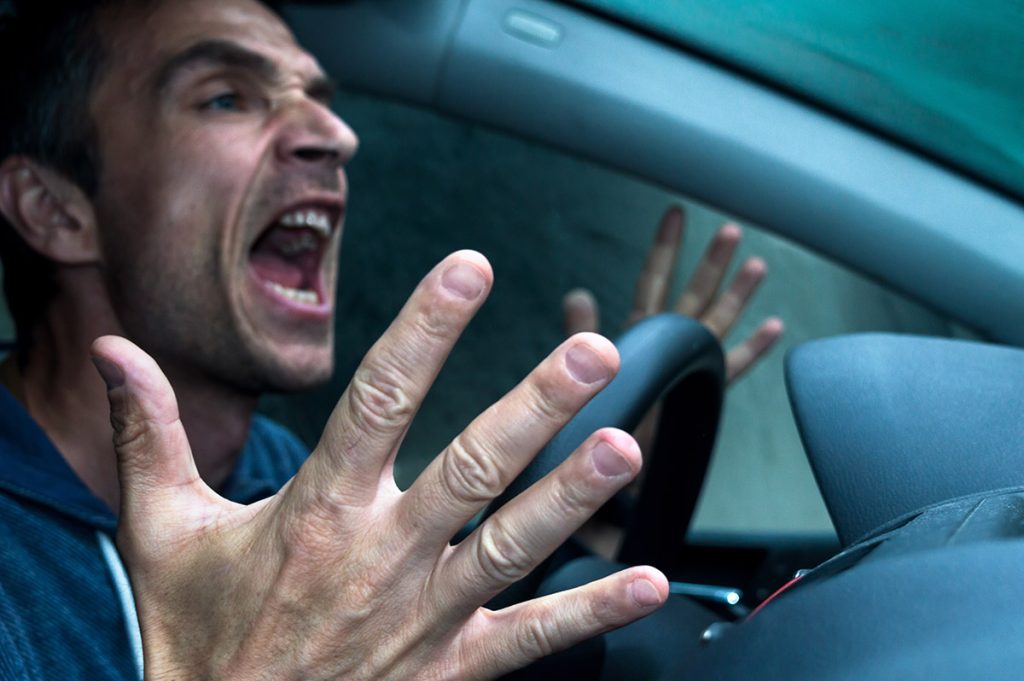Depending on the circumstances involved, road rage may constitute a felony or misdemeanor under state and federal road rage/aggressive driving laws. It may also impact your insurance and license rights.
Road rage laws explained.
An assault with a dangerous weapon or motor vehicle by the passenger or driver(s) of one motor vehicle on the driver or passenger of another vehicle caused by an incident that occurred on the roadway.
Road rage is not a traffic offense in the traditional sense because, upon arrest, prosecutors may charge the accused with a criminal offense instead of a traffic violation. Note that the facts presented may lead to both road rage and traffic violation charges. To clarify, traffic offenses include acts including speeding, failing to stop or yield, seat belt violations, driving under the influence, and so on. Road rage offenses, depending on the jurisdiction, include assault, reckless driving, disturbing the peace, and offenses listed under the public order act.
Remember, “public order crimes” refers to all actions that interfere with the normal flow of society.
Quick take:
- Road rage becomes a crime (illegal) when either party engages in reckless aggressive driving, assaults the other or causes property damage.
- Related charges include assault, and disturbing the peace.
- Most states prosecute road rage incidents under reckless driving or aggressive driving statutes.
- The punishment for assault, property damage, and reckless driving depends on state law.
What can happen to drivers with road rage?
In the states, it depends on state law. For example, in Virginia the law does not require prosecutors to prove intent, meaning, it is easier to prosecute road rage incidents under the state’s reckless driving laws. Section 46.2-868 “Aggressive Driving Penalties” states that an individual is guilty of aggressive driving if the person violates section 46.2.888 “stopping on highways: removing the motor vehicle from the roadway.”
The section prohibits:
- Stopping a vehicle on a highway in a way that impedes or renders dangerous -the use of the highway.
- Not moving the vehicle if it is movable after an accident or emergency.
What is vital to remember is 46.2-868.1. reads in part, quote “that person is a hazard to another person or commits an offense in clause (i) with the intent to harass, intimidate, injure or obstruct another person.”
What that means is, if an incident happens on the highway, you fail to move your vehicle, or you harass, intimidate, or injure anyone involved in the incident. You are guilty of a class 2 misdemeanor in Virginia. If you drive a vehicle aggressively or display a willful and wanton disregard for the safety of others on the road, the crime escalates into a class 1 misdemeanor.
Note that physically attacking another or causing property damage during a road rage incident are separate offenses in most states.

When does road rage turn into a criminal offense?
As noted, the difference between road rage and aggressive driving is that road rage involves the use of a weapon to retaliate or act against a driver or pedestrian that you feel wronged by. Actions that constitute road rage, include forcing another driver off the road, exiting your vehicle with intent to damage property or inflict injury, road harassment, dangerous maneuvers on the road such as braking Infront of another vehicle, tailgating, or nudging other vehicles, and other aggressive actions triggered by wrath.
The point is. Being angry on the road is not a criminal offense, a criminal offense occurs when you take that extra step. For example, you get out of your vehicle and physically assault another.
Note: Laws may differ specifically for your area.
What if someone threatens your safety on the road?
If you feel threatened, you should call law enforcement before the incident escalates. Officers also recommend that you turn on your dashcam if you have one. What law enforcement officers may need, includes the perpetrator’s physical description, car make, and other identifying information, the date and time of the incident, and the statement.
What charges can a road rage incident lead to:
Road rage that leads to action may result in the following charges:
Reckless or aggressive driving
Reckless driving refers to a situation where a driver operates a vehicle in a way that endangers other road users. If the driver acts willfully and with reckless disregard for the safety of others, the actions may result in jail or prison time, probation, fines, or in some cases license suspension. Remember, the court must consider the circumstances leading up to the incident, including weather conditions, the time of day, people, and animals in the area, and the vehicle’s
An aggressive driver has an intent, which could be to harass, injure, take revenge, or damage property, whereas a reckless driver engages in unsafe behavior on the road. Therefore, an individual will face aggressive driving charges if the person intentionally:
- Uses the vehicle as a weapon
- The person intentionally changes lanes in an unsafe manner.
- Runs another vehicle off the roads or blocks another from switching lanes
- Throws objects at other vehicles or intentionally commits other reckless acts on the road.
For example, 2021 Florida statute section 316.1923 defines “aggressive careless driving” as performing two or more of the following acts in succession or simultaneously. (1) exceeding the speed limit. (2) changing lanes improperly or in an unsafe manner. (3) following a vehicle too closely. (4) failing to yield to the right of way. (5) improperly passing. (6) violating signal devices or traffic controls.
Vehicular Assault
If you injure another person with your vehicle, some states may charge you with vehicular assault which would mean that in addition to being held liable in civil court there is also a chance that you could be charged with a crime. The grounds for being charged with vehicular assault are similar to that of reckless/aggressive driving in that the basis is causing injury to someone else while:
- Driving while intoxicated or under the influence of drugs
- Driving while your licence is revoked/suspended
- Driving recklessly or without care
Some states require that the injury sustained in the assault be serious in order to proceed with a vehicular assault charge. States that specifically have a vehicular assault crime are:
- Colorado
- Delaware
- Montana
- New Hampshire
- New York
- Ohio
- Oregon
- Tennessee
- Washington
Road rage laws and physical or verbal assault
A vehicle is a dangerous weapon, but sometimes, road rage escalates into physical altercations, verbal attacks, or disturbing the peace.
Note that laws related to physical assault and verbal abuse vary depending on state law. Furthermore, disturbing the peace refers to a wide scope of offenses, including challenging someone to fight in a public setting, shouting profanities at other drivers, shouting in public with the intent to cause violence, and using offensive words in a public setting.
In most states, disturbing the peace is a misdemeanor that may result in penalties, including jail time, community service, probation, or fines. Note, the charges may escalate if the accused has prior records.
Is verbal road rage illegal?
Yes, verbal road rage may constitute disturbing the peace in some jurisdictions, and as mentioned may result in prison time, fines, community service, or other suitable punishment, including anger management classes.
Note, yelling insults or profanities at someone is not a crime in most places. Verbal road rage turns into a crime if one of the parties physically assaults the other or causes physical harm. Remember, the freedom of speech protects your right to express yourself, even if it means flipping off the other driver.
How do you prove road rage?
Remember, a road rage is an extreme form of aggressive driving motivated by an intention. Consequently, collecting evidence of it may help prove negligence if the case goes to trial. In many states, if you are the injured party, the burden of proving negligence is on you, meaning it is in your best interest to record or acquire records of the incident.
What was the outcome of police investigations?
If the police issued a traffic violation ticket to the other party or charged the individual with a criminal offense. You may consult with an attorney to decide if there are grounds to take civil action. If you are at fault, the other party may take civil action against you, thus it is also a good idea to protect yourself.
One way to protect yourself from liability is to install a dashcam. This will allow you to record the incident then use the footage to prove your case.
If successful, the judge may order the accused to pay damages, including punitive damages depending on state law.
Can you sue for road rage?
If the accused intentionally struck your vehicle, physically attacked you, drove you off the road, side-swiped you, or in any way caused damage to your person or property. You may take civil action against that person. But if the person called you a name or flipped you off, there is not much you can do legally.
To take civil action here is what you must do:
- Establish liability: did the person commit the acts intentionally, or was it an accident? If the damage was intentional or the result of negligence, you may take civil action. But remember, the burden of proof is on you, so you must gather evidence.
- Consult with a lawyer to decide what to claim: you may file a suit to recover lost wages, medical costs, or pain and suffering caused by the incident. In some regions, you may also recover damages for emotional distress.
Is road rage a crime?
Road rage is not a crime. However, reckless driving, assault, and all unlawful actions that may result from road rage are crimes. Consequently, as mentioned, most states prosecute road rage incidents under reckless driving and traffic offenses statutes.
What should you do during a road rage incident?
- Calm down and do not take any steps that might lead to injury or property damage, such as tailgating, sideswiping, or assault.
- Avoid using threatening gestures or following the other party.
- Turn on your dashcam if you have one.
- If you feel threatened or are worried about your safety call law enforcement.
- Avoid disturbing the peace or blocking the highway.
Road rage, reckless driving, and federal law
Under federal law 263.6 “Speeding or reckless Driving,” quote “No person shall drive a motor vehicle on the site at a speed greater than or in a manner other than what is reasonable and prudent for the particular location, given the conditions of traffic, weather, and road surface and having regard to the actual and potential hazards existing.”
Consequently, a road rage incident may lead to both state and federal prosecution.
